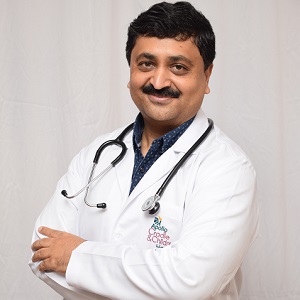Pediatric surgery is a sub-specialty of surgery that deals with the diagnosis and surgical treatment of children from newborns to adolescents. On the other hand, urology is a branch of medicine that deals with the study and treatment of disorders related to the urinary system in both males and females and the male reproductive system. Let's delve into the basics of paediatric surgery and urology and their relevance in the treatment of common conditions in children.
Pediatric Surgery
Pediatric surgery is a diverse field that encompasses a range of surgical procedures, from simple ones such as removing a mole or cyst to complex ones such as repairing complex congenital anomalies. The goal of paediatric surgery is to provide the best possible care to infants, children, and adolescents in a child-friendly environment.
Common Conditions in Pediatric Surgery
Some of the most common conditions treated by paediatric surgeons include:
Inguinal Hernia – Inguinal hernias occur when a part of the intestine protrudes through a weak spot in the abdominal muscles. This condition is common in infants and young children, and surgery is usually recommended to prevent complications such as obstruction.
Appendicitis – Appendicitis is a common condition that affects children and requires surgery. The appendix is a small pouch attached to the large intestine, and when it gets inflamed, it needs to be removed to prevent complications such as rupture.
Congenital Anomalies – Congenital anomalies refer to structural defects that are present at birth and may require surgical intervention to correct. These anomalies may affect various parts of the body, including the heart, lungs, kidneys, and limbs.
Tumours – Children may develop tumours that require surgical removal. Tumours may be benign or malignant, and the treatment plan will depend on the type of tumour.
Urology
Urology is a specialised field that deals with the urinary tract in both males and females and the male reproductive system. Urologists are trained to treat conditions such as bladder and kidney infections, incontinence, and cancer of the urinary system.
Common Conditions in Urology
Some of the most common conditions treated by urologists include:
Urinary Tract Infections: UTIs are common in children and may cause symptoms such as pain during urination, frequent urination, and fever. Urologists may recommend antibiotics or other treatments to manage the infection.
Hydronephrosis: Hydronephrosis is a condition that occurs when urine is unable to flow properly from the kidney to the bladder, leading to swelling of the kidney. Urologists may recommend surgery to correct the underlying issue and prevent further damage.
Bedwetting: Bedwetting is a common condition in children, and urologists may recommend behavioural therapy or medications to manage the condition.
Cryptorchidism: Cryptorchidism is a condition that occurs when the testicles fail to descend into the scrotum, and it may require surgical intervention to correct.
Surgical procedures in paediatric urology
Surgical procedures are common in paediatric urology and may include:
Circumcision: Circumcision is the surgical removal of the foreskin in males, and it may be recommended for cultural, religious, or medical reasons.
Hypospadias Repair: Hypospadias is a congenital condition where the urethral opening is not at the tip of the penis, and surgery may be required to correct the issue.
Nephrectomy: This procedure is the surgical removal of a kidney, and it may be necessary in cases where the kidney is damaged or diseased, or if there is a tumour present.
Pyeloplasty: Pyeloplasty is a surgical procedure to repair a blockage or narrowing of the renal pelvis, which is the part of the kidney that connects to the ureter.
Vesicoureteral Reflux Repair: Vesicoureteral reflux is a condition where urine flows backwards from the bladder to the kidneys, and surgery may be necessary to correct the issue.
Bladder Reconstruction: Bladder reconstruction may be necessary in cases where the bladder is damaged or diseased, or if there is a congenital condition present.
Orchiopexy: This is a surgical procedure to correct undescended testes, which is a condition where one or both testicles have not moved down into the scrotum.
These are just a few examples of the many surgical procedures that may be performed in paediatric urology. It is important to discuss all options with a urologist and carefully consider the potential risks and benefits of any procedure before making a decision. With the right treatment and care, many children can overcome urological issues and lead happy, healthy lives.
Request an appointment at Apollo Cradle, Bengaluru - Jayanagar. Call 1860-500-4424 to book an appointment.
If your child is experiencing symptoms such as severe pain, difficulty breathing, or a sudden injury, it's important to consult with a medical professional. A doctor can determine if surgery is necessary based on the child's condition.
While every surgery involves some degree of pain, pediatric surgery is carefully planned and executed to minimize pain and discomfort for the child. The surgical team will provide appropriate pain management techniques to ensure the child's comfort during and after surgery.
The recovery process for pediatric surgery will depend on the type of surgery and the child's health status. Generally, children will need to rest and avoid physical activity for a while after surgery, and they may need to take pain medication and follow a specific diet. The surgical team will provide detailed post-operative instructions for the child and their family.
Parents can prepare their child for surgery by explaining the procedure in age-appropriate terms and answering any questions the child may have. It's also important to help the child feel comfortable and calm on the day of the surgery, by providing comfort items such as a favourite toy or blanket. The surgical team will also guide how to best prepare the child for surgery.
Our Doctors
Treatments
- Anaesthesia & Pain Management
- General Pediatrics
- Growth Chart
- Newborn Screening
- Pediatric Allergy
- Pediatric Dermatology
- Pediatric Endocrinology
- Pediatric Nutrition
- Pediatric Orthopedics
- Pediatric Psychology
- Pediatric Surgery & Urology
- ROP Screening
- Stem Cell banking
- Vaccination/Immunisation Schedule

 93% Patient Satisfaction Score
93% Patient Satisfaction Score


